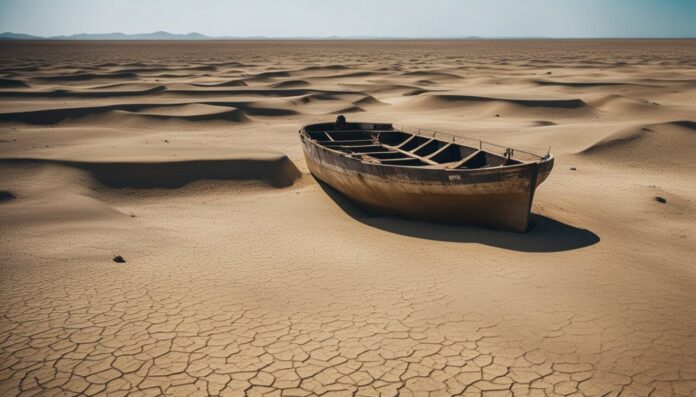
The oceans cover over 70% of the Earth’s surface and play a central role in regulating the planet’s climate, providing food and livelihoods for millions of people, and supporting an enormous array of marine and terrestrial life.
However, have you ever wondered what would happen if the oceans disappeared?
While it is a completely hypothetical scenario, it is worth exploring the potential consequences of such an event.
So, let’s dive into this thought experiment.
Related:
What Would Happen If Oceans Disappeared?

If the oceans were to disappear, the impact on the global climate would be unimaginable. The oceans absorb heat from the sun and distribute it around the world, helping to regulate temperatures and weather patterns.
Without this vital mechanism, the Earth’s climate would become much more extreme, with temperatures fluctuating wildly and weather patterns becoming completely unpredictable. This would have a significant impact on almost everything on Earth.
Key Takeaways
- The disappearance of the oceans would have a huge impact on the global climate, leading to extreme temperatures and unpredictable weather patterns.
- The ecological consequences of the oceans disappearing would be catastrophic, with marine life dying off and ecosystems collapsing.
- Without oceans, it is probable that all life on Earth would be lost.
- The planet itself would change significantly with shifts in land masses and potential for loss of all (even fresh) water on Earth.
Oceans Dried Up – What Now?
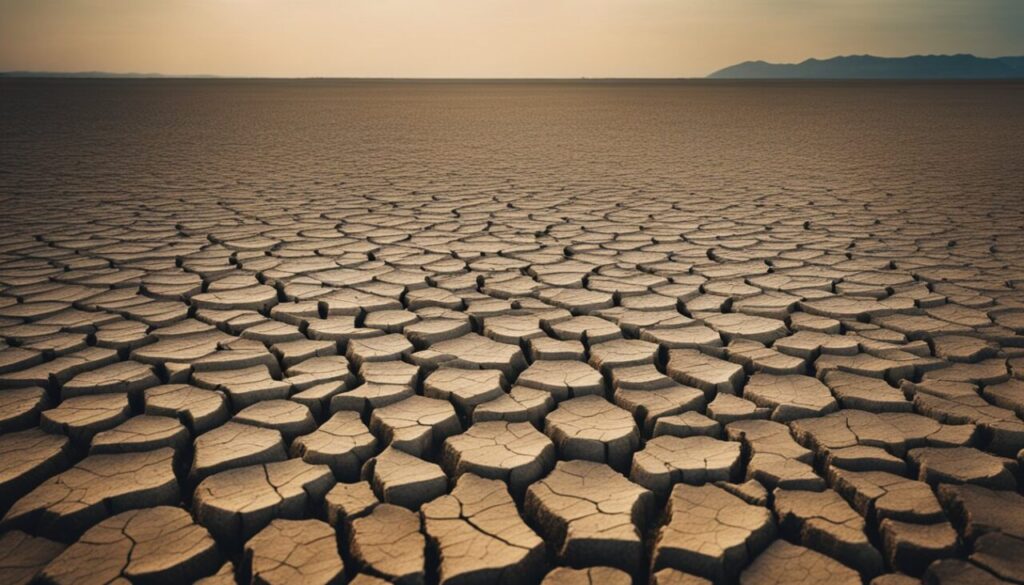
To comprehend the enormity of Earth’s oceans, consider that they contain approximately 97% of the planet’s water. The remaining 3% is freshwater, with the majority locked in glaciers and ice caps.
Additionally, the world’s oceans cover a total surface area of approximately 361 million square kilometers or 139 million square miles.
Moreover, oceans are home to 243,613 known marine species, with thousands if not millions more yet to be discovered.
We’re providing all of this data so that you can picture how catastrophic it would be if oceans disappeared.
Here we’ll try to summarize consequences in a few paragraphs and then we’ll deep dive into each of the categories.
Firstly, the absence of oceans would have a major impact on the climate.
Secondly, the disappearance of oceans would have a significant impact on the food chain and all ecosystems on Earth.
Thirdly, the absence of oceans would have a major impact on all life on Earth.
And finally, Earth without the oceans would be completely different planet itself.
So, it is rather clear that the disappearance of oceans would have a catastrophic impact on the planet, but let’s explore this huge impact in more details.
Global Climate Impact
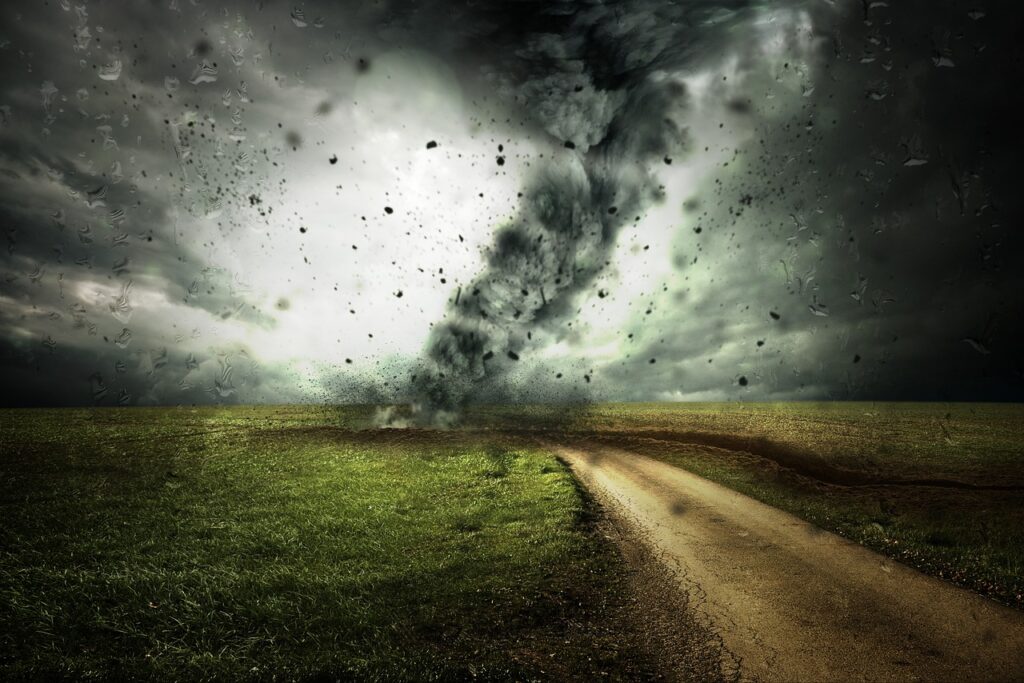
Atmospheric Changes
The disappearance of oceans would cause significant atmospheric changes. Ocean plays a vital role in regulating the Earth’s climate by absorbing carbon dioxide and releasing oxygen. Without oceans, the carbon dioxide levels in the atmosphere would increase, leading to an enhanced greenhouse effect. This would result in a rise in global temperatures and could trigger a chain reaction of catastrophic events.
Temperature Extremes
The disappearance of oceans would cause significant temperature extremes on Earth. The ocean acts as a heat sink, absorbing and releasing heat, which helps regulate the Earth’s temperature. Without the ocean, the temperature of the planet would become more extreme, with hotter and colder regions. The polar regions would experience more significant temperature rises, leading to the melting of ice caps and rising sea levels.
Weather And Rain Without Oceans
The disappearance of oceans would also alter weather patterns across the globe. The ocean’s currents and temperatures play a crucial role in driving weather patterns and climate cycles. Without the ocean, the world would experience more frequent and severe weather events, such as hurricanes, typhoons, and cyclones.
Additionally, if oceans were to disappear, the world would lose a significant source of water. Namely, oceans contribute to the water cycle by evaporating water into the atmosphere, which later falls as rain.
The absence of this cycle would disrupt weather patterns and drastically reduce the planet’s overall water supply.
And so, in that case – we must ask ourselves the following question:
How Much Water Would Be Left?
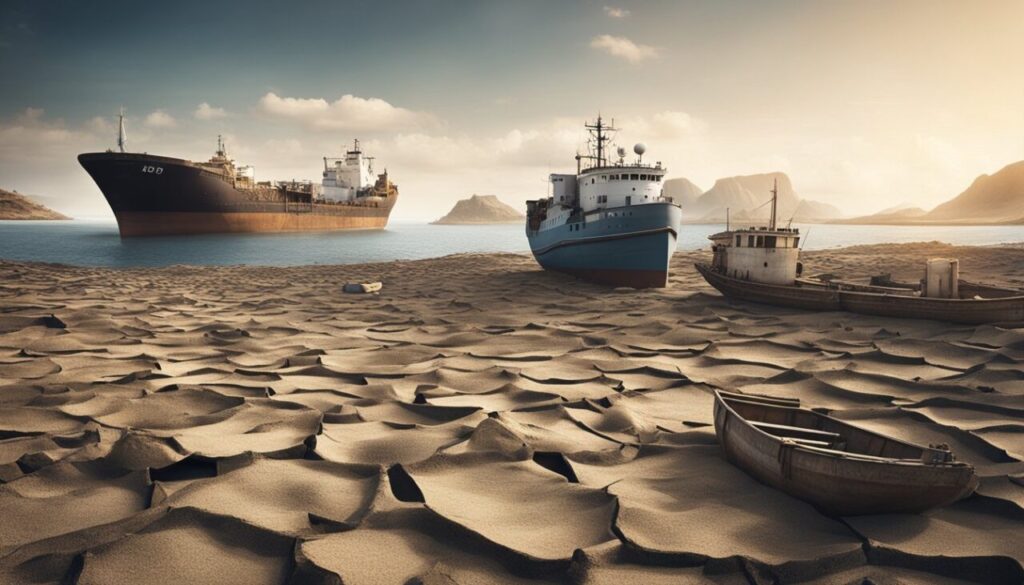
Well, without oceans, Earth’s surface would be left with only the freshwater available in lakes, rivers, and underground reservoirs.
Note: Have in mind that in the absence of oceans, even the freshwater would probably diminish significantly (if not completely) over time.
As mentioned previously, oceans contain approximately 96 to 97%% of the Earth’s total water, leaving a mere 3% as freshwater.
The loss of oceans would result in an extremely large reduction in the available water, leading to severe water scarcity and threatening the survival of numerous species, including humans.
To put this into perspective, consider that the volume of Earth’s oceans is estimated to be around 1.332 billion cubic kilometers. If we were to distribute this water evenly across the Earth’s landmass, the entire planet would be submerged under an ocean approximately 2.7 kilometers deep.
So, without oceans, we would be left with the following:
- Ice caps and glaciers: About 1.7% of the Earth’s water is stored in ice caps, glaciers, and permanent snow.
- Groundwater: Groundwater accounts for about 1.7% of the Earth’s water.
- Lakes: Lakes contain about 0.01% of the Earth’s water.
- Rivers: Rivers hold about 0.001% of the Earth’s water.
- Atmosphere: Water vapor in the atmosphere represents about 0.001% of the Earth’s water.
Now, isn’t this astonishing?
Especially when you consider how big some lakes are, like Lake Superior or Lake Michigan. And yet, all lakes combined contain only about 0.01% of Earth’s water.
And did you know how many lakes are there?
It’s an astonishing number – it is estimated there are over 304 million lakes in the world.
And all that water is minuscule compared to oceans.
Therefore, without oceans probably there wouldn’t be any life on Earth.
However, as always here at CuriousMatrix.com, we like to explore more.
So let’s hypothesize about the potential for human survival on Earth without oceans and the survival of any life on Earth without oceans.
Would Humanity Survive Without Oceans?

Let’s just answer this straight away: Without oceans, humans probably would not survive.
As mentioned, oceans play a crucial role in maintaining the planet’s climate, and their absence would result in extreme and uninhabitable environmental conditions.
One of the significant consequences would certainly be the scarcity of rain. Oceans contribute significantly to the moisture content in the atmosphere, influencing rainfall patterns.
The absence of oceans would create a moisture deficit, particularly in coastal and inland areas, transforming once fertile lands into deserts.
This scarcity of rain would exacerbate the challenges of food production and further strain water resources which would all lead to slow but certain demise of humans.
So, this leads us to questioning overall life on Earth in the hypothetical scenario where oceans have dried up.
Would Life Exist On Earth Without Oceans
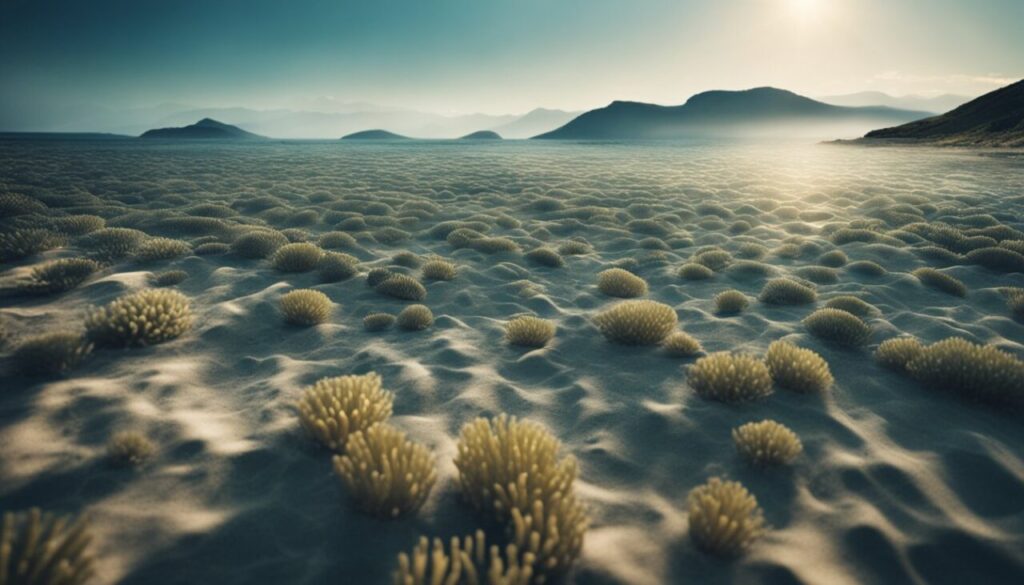
Again, to answer this straight away – probably not.
It would not happen immediately but certainly over time. We have Mars as an example. Namely, evidence suggests that ancient Martian oceans existed billions of years ago. However, over time, Mars lost its magnetic field, and solar winds stripped away its atmosphere, causing the oceans to evaporate and leaving the planet deserted.
Probably similar would happen to Earth over time.
Oxygen And Oceans
Besides that, oceans are major contributors to the production of oxygen on Earth.
Phytoplankton, microscopic organisms found in the oceans, produce a significant portion of the world’s oxygen through photosynthesis.
The disappearance of oceans would result in a drastic reduction in oxygen production, jeopardizing the very air we breathe.
Approximately 50-85% of the world’s oxygen is produced by phytoplankton through photosynthesis.
Related:
The loss of these microscopic organisms, along with other oxygen-producing marine life, would have deadly consequences for the composition of the Earth’s atmosphere.
And so, all of that leads us to the conclusion that without Oceans there wouldn’t be life on Earth.
Without oceans, Earth would be an unfertile and inhospitable planet, lacking the conditions necessary for supporting almost any kind of life.
But what about the planet itself?
Well, the planet would survive but with many geological changes.
Geological and Hydrological Changes

Shifts in Land Masses
The disappearance of the oceans would cause significant geological changes. The weight of the water in the oceans exerts a force on the Earth’s crust, which helps to maintain the balance of the planet’s tectonic plates.
Without this force, the plates would shift and move more freely, potentially causing more earthquakes and volcanic activity. Additionally, the lack of water pressure on the ocean floor could cause the crust to rise, leading to changes in sea level and coastal erosion.
Altered River Systems
The absence of oceans would also have a significant impact on river systems. Rivers rely on the oceans for their water supply, as they are replenished by rain that falls over the ocean and is carried inland by the winds. Without this source of water, many rivers would dry up, leaving behind empty landscapes.
Groundwater Depletion
The disappearance of the oceans would also have an impact on groundwater supplies.
The oceans play a crucial role in the hydrological cycle, as they provide the primary source of moisture that evaporates and falls back to the Earth as rain.
Without this source of moisture, groundwater supplies would also be depleted.
In summary, the disappearance of the oceans would have significant geological and hydrological implications. The shifting of tectonic plates, alteration of river systems, and depletion of groundwater would probably lead to a completely dry or waterless planet.
As is the case with almost all planets in our Solar System.
Sure, there is water here and there on some planets but Earth is the only celestial body having constant areas of liquid water on its surface.
Conclusion
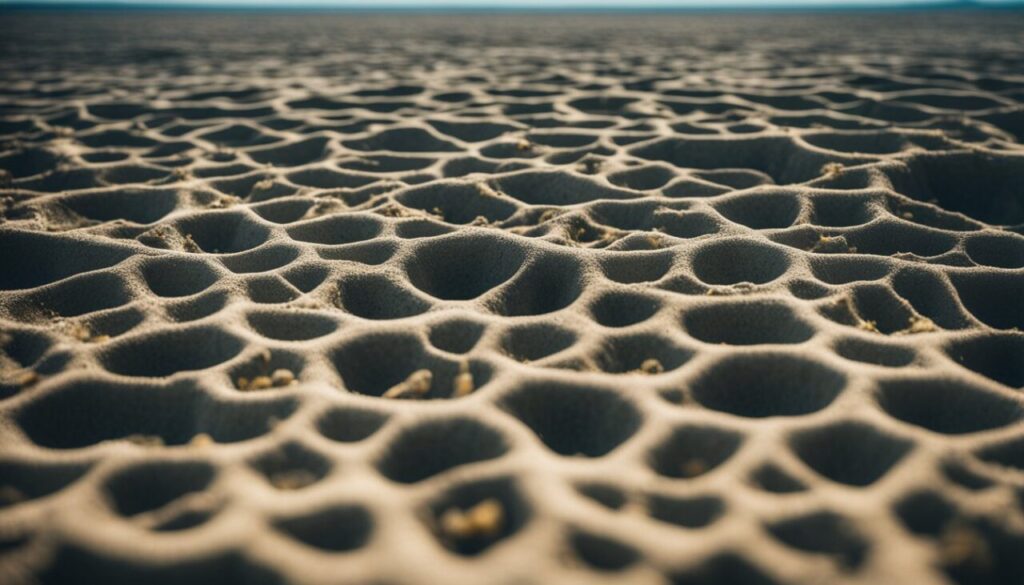
In this hypothetical scenario of oceans disappearing from Earth, the consequences would be terrible and across the board. From the collapse of ecosystems to the threat of water scarcity, humanity and all life on the planet would face life-threatening challenges. Most probably, in the long run, all life would perish from Earth. The planet itself would still be here but with many geological changes and probably completely uninhabitable.
Note: If you enjoyed this article you might also like:




















